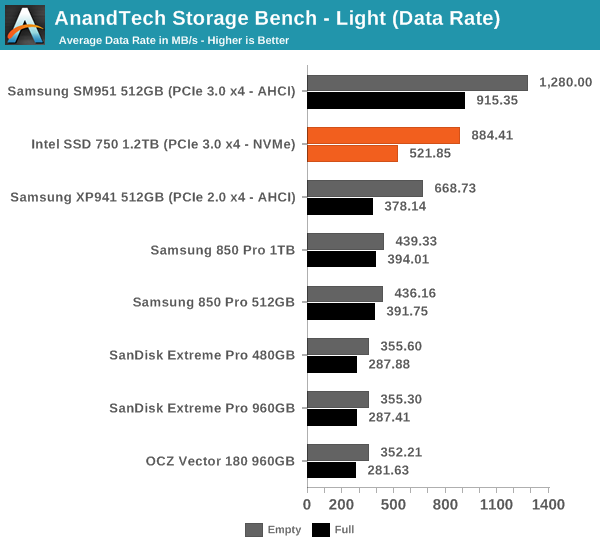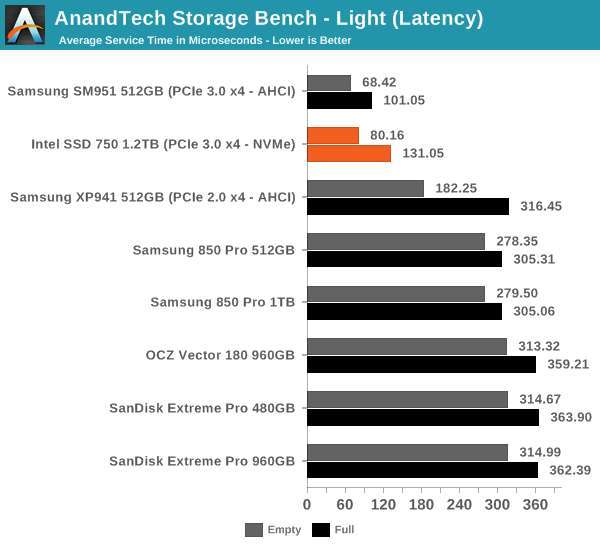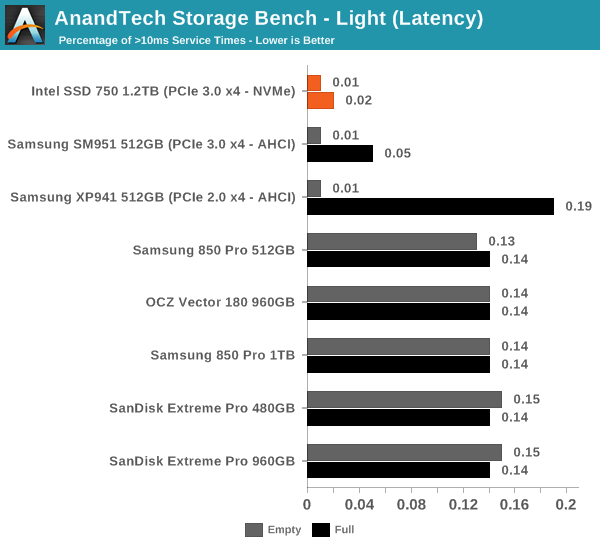Intel SSD 750 PCIe SSD Review: NVMe for the Client
by Kristian Vättö on April 2, 2015 12:00 PM ESTAnandTech Storage Bench - Light
The Light trace is designed to be an accurate illustration of basic usage. It's basically a subset of the Heavy trace, but we've left out some workloads to reduce the writes and make it more read intensive in general.
| AnandTech Storage Bench - Light - Specs | ||||||||||||
| Reads | 372,630 | |||||||||||
| Writes | 459,709 | |||||||||||
| Total IO Operations | 832,339 | |||||||||||
| Total GB Read | 17.97 GB | |||||||||||
| Total GB Written | 23.25 GB | |||||||||||
| Average Queue Depth | ~4.6 | |||||||||||
| Focus | Basic, light IO usage | |||||||||||
The Light trace still has more writes than reads, but a very light workload would be even more read-centric (think web browsing, document editing, etc). It has about 23GB of writes, which would account for roughly two or three days of average usage (i.e. 7-11GB per day).
| AnandTech Storage Bench - Light - IO Breakdown | |||||||||||
| IO Size | <4KB | 4KB | 8KB | 16KB | 32KB | 64KB | 128KB | ||||
| % of Total | 6.2% | 27.6% | 2.4% | 8.0% | 6.5% | 4.8% | 26.4% | ||||
The IO distribution of the Light trace is very similar to the Heavy trace with slightly more IOs being 128KB. About 70% of the IOs are sequential, though, so that is a major difference compared to the Heavy trace.
| AnandTech Storage Bench - Light - QD Breakdown | ||||||||||||
| Queue Depth | 1 | 2 | 3 | 4-5 | 6-10 | 11-20 | 21-32 | >32 | ||||
| % of Total | 73.4% | 16.8% | 2.6% | 2.3% | 3.1% | 1.5% | 0.2% | 0.2% | ||||
Over 90% of the IOs have a queue depth of one or two, which further proves the importance of low queue depth performance.

The same trend continues in our Light trace where the SM951 is still the king of the hill. It's obvious that Intel didn't design the SSD 750 with such light workloads in mind as ultimately you need to have a relatively IO intensive workload to get the full benefit of PCIe and NVMe.












132 Comments
View All Comments
kaisellgren - Friday, May 1, 2015 - link
Do not forget the Fiji 390x!dzezik - Saturday, May 7, 2016 - link
who needs chipset for PCIe if You have 40 lanes directly from CPU. it is step back in the configuration. it was big step ahead to put memory and PCIe to CPU. the chipset is useless.zrav - Thursday, April 2, 2015 - link
>It's again a bit disappointing that the SSD 750 isn't that well optimized for sequential IO because there's prcatically no scaling at allThat's a weird conclusion. I'd say it is quite impressive that the drive almost reaches peak throughput at QD 1 already. Requiring higher QD to achieve more throughput is a not a positive characteristic. But if that matters depends on the usage scenario ofc.
Kristian Vättö - Thursday, April 2, 2015 - link
It's impressive that the performance is almost the same regardless of queue depth, but I don't find 1.2GB/s to be very impressive for a 1.2TB PCIe drive.futrtrubl - Thursday, April 2, 2015 - link
Unfortunately your use of un-normalised standard deviation for performance consistency makes them a barrier to understanding. A 1000 IOPS drive with 5% variance is going to have lower standard deviation and by the way you have presented it "better consistency" than a 10000 IOPS drive with 1% variance.Kristian Vättö - Thursday, April 2, 2015 - link
Any suggestions for improving the metric? Perhaps divide by the average IOPS or its square root to take that into account as well?futrtrubl - Thursday, April 2, 2015 - link
Yes, I think dividing by the average IOPs would be perfect. You could even x100 to get it to a sort of percentage deviation.bricko - Saturday, April 4, 2015 - link
Here is test and review of the new 750, what is up with boot time...its SLOWEST of 14 drives. Everything else is great, but boot time. The Plextor M6 is 15 seconds, the 750 is 34 sec....ideashttp://techreport.com/review/28050/intel-750-serie...
Ethos Evoss - Saturday, April 4, 2015 - link
Plextor SSDs - BESTbricko - Saturday, April 4, 2015 - link
Its only slow on the boot time, otherwise it beats ALL other ssd on different loads and tests , by 2 - 3 times....odd it seems